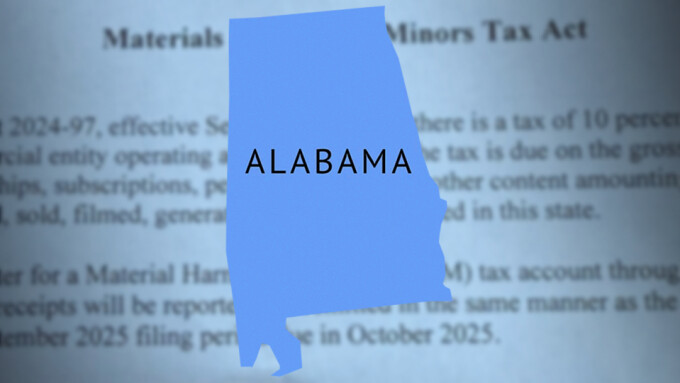MONTGOMERY, Ala. — The Alabama Department of Revenue has begun sending notices to adult site operators about a new 10% tax on their revenues, set to be enforced starting Sept. 1.
In April 2024, Alabama enacted HB 164. The bill’s age verification requirements took effect in October 2024, prompting some adult sites to block access in the state.
The law also imposes a 10% tax on adult websites’ gross receipts. With that provision set to take effect Sept. 1, the Department of Revenue has begun contacting adult site operators.
One such notice, which XBIZ has seen, includes the following information:
In accordance with Act 2024-97, effective September 1, 2025, there is a tax of 10 percent levied on the gross receipts of any commercial entity operating an adult website. The tax is due on the gross receipts of all sales, distributions, memberships, subscriptions, performances and all other content amounting to material harmful to minors that is produced, sold, filmed, generated, or otherwise based in this state.
The entity should register for a Material Harmful to Minors (MHM) tax account through My Alabama Taxes. The tax on these gross receipts will be reported and remitted in the same manner as the sales and use taxes beginning with the September 2025 filing period due in October 2025.
Registration will be available beginning Sept. 1.
A media representative for the Alabama Department of Revenue (ALDOR) told XBIZ that the department has notified eleven entities thus far, and that site operators were identified as potentially subject to the tax through "internal research."
"We're continuing our efforts to identify others," the ALDOR rep said.
Free Speech Coalition Executive Director Alison Boden noted that while the First Amendment precludes financially burdening protected speech based on its content, recent events have called such protections into question.
“Before the ruling in FSC v. Paxton, I would have said that the Alabama law is a clear example of selectively taxing adult companies because of their content, and that even a conservative court would strike it down as unconstitutional,” Boden told XBIZ. “In a post-Paxton world where the meaning of the First Amendment is seemingly up for grabs, it's unclear.”
Boden also pointed out that Alabama residents have previously demonstrated greater willingness to speak out on the issue of age verification and take political action, sending over 20,000 messages to legislators.
“That's more than Texas, Florida and Arkansas combined,” Boden observed. “If websites want to encourage their users to speak out about the tax, FSC has a form they can use.”
Industry attorney Lawrence Walters called the law another example of the increasingly hostile legal climate facing adult website operators at the state level, and agreed that enforcing the tax on adult website content could prompt legal challenges.
"This may constitute an unconstitutional content-based burden on speech," Walters told XBIZ. "However, at present, no court order prohibits enforcement of the tax obligations. Website operators with any connection to Alabama should consult with their tax advisors to evaluate how this law impacts their business and develop a plan of action."
Boden noted that the tax leaves limited options for adult sites, which can end any production in Alabama and refuse to do business with Alabama customers, or alternatively attempt to preserve their profit margins by passing the increased cost on to Alabama consumers.
The adult site that shared the notice told XBIZ that it had received the letter despite the fact that it is not based in Alabama and has been blocking access there since October. According to the ALDOR rep, that is normal.
"The duty of the Alabama Department of Revenue is to make those entities that may be subject to the tax aware of the new tax levy," the rep explained. "If an entity receives a notice, that does not mean that the department has determined that the entity is subject to the new tax."








